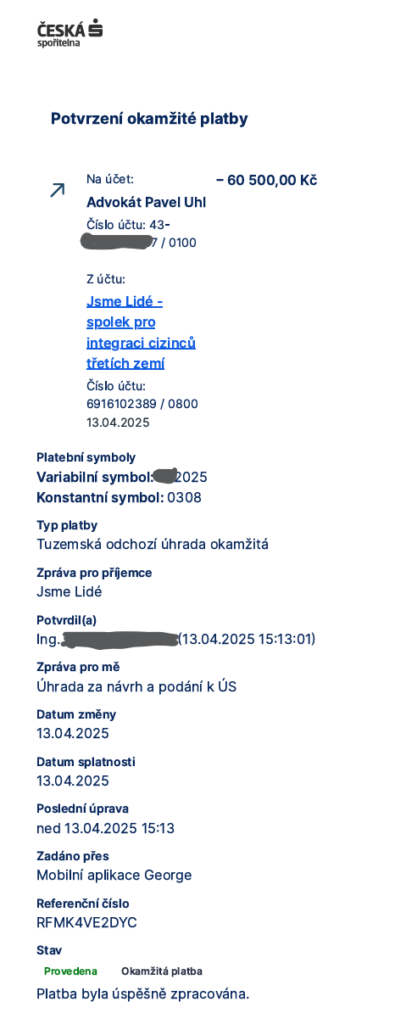On February 11, 2025, Lex Ukrajina 7 came into force with an amendment prohibiting the granting of citizenship to Russians.
Despite the fact that it has been in force for six months and has been repeatedly analyzed by initiative groups, human rights activists, and professional lawyers, many Czech citizens still do not realize what a “Trojan horse” has been slipped in under the guise of concern for the state security.
In reality, this amendment is not only discriminatory and does nothing to address security issues. A much more serious question arises: does it violate the sovereignty of the Czech Republic?
Because the only ones who really benefit from it and have no problems with it are the Russian authorities.
The very manner in which this law was passed raises many questions.
The amendment, which radically changes the rules for obtaining citizenship, was simply “attached” to the law on extending temporary protection for refugees. Thus, if the Senate had not approved the bill, it would have jeopardized the situation of hundreds of thousands of people. A clever way to get everyone to vote “yes,” isn’t it?
Opponents tried to enter the debate: more than ten opposition MPs signed up to speak. But instead of an honest discussion, the authors of the law announced pevné zařazení hlasování — a forced vote without debate. The discussions were simply silenced.
In Russia, there is a well-known phrase attributed to State Duma Speaker Boris Gryzlov: “Parliament is not a place for discussion.” Sadly, in the case of Lex Ukrajina 7, the Czech Chamber of Deputies behaved in exactly the same way — deputies were not given the opportunity to speak out against the controversial amendments.
For Russian citizens who have observed the work of the Russian authorities and left the country, all this sounds all too familiar.
For example, recently in Russia, punishment for searching for “prohibited information” on the internet was “attached” to a bill on transport companies — almost no one noticed. The irony is that the Czech Republic seems to be striving to distance itself from everything Russian, but in practice, its law-making is increasingly resembling Russian methods.
Lost in legal fog
Let us recall that the amendment to the law contains two key innovations.
First, it requires Russians who wish to obtain Czech citizenship to renounce their Russian citizenship.
Second, and this is rarely mentioned directly, while the temporary protection regime for Ukrainian refugees is in effect, the processing of all applications for citizenship from Russians has been completely suspended. In other words, in practice, Russians are completely banned from obtaining Czech citizenship.
Nevertheless, the same politicians who promoted this law continue to repeat in every interview that “Russians must make a choice” — but now they have no choice at all.
The law, which was presented as a “requirement to renounce Russian citizenship,” in fact makes this renunciation impossible.
According to the UN international convention, as well as the legislation of Russia and the Czech Republic, it is impossible to renounce sole citizenship without having confirmation of the granting of a new one (because the second part of “our” annexation has completely frozen all applications for citizenship, i.e., they are not processing applications from Russian citizens). This creates a paradox:
The law, which was presented as a “requirement to renounce Russian citizenship,” actually makes this renunciation impossible.
We can imagine how happy the Russian authorities must be.
The illusion of security
But do these measures really contribute to the security of the Czech Republic in any way? Or are we dealing with pure populism?
The authors of the amendment have never explained how it helps to protect the state. Moreover, even the judges of the Constitutional Court have not received any explanation of how exactly the proposed measures increase security and why the existing instruments are not sufficient.
In response to the lawsuit filed by senators, the Czech government has not provided a single concrete example to justify the need for new restrictions on Russians.
In the meantime, the measures are working in a strange way.
It turns out that it is not ordinary Russians who can most easily obtain a certificate of renunciation of citizenship, but rather agents and spies who are genuinely unfriendly. Perhaps even without an actual refusal: the authorities will simply issue the necessary document. Or they will temporarily deprive them of their citizenship and then restore it after they have “completed their mission.” But ordinary people who do not have access to such mechanisms and who do not harbour any ill will towards the Czech Republic will find themselves in a dead end.
Restrictions that don’t restrict anything
A complete ban on Russians obtaining Czech citizenship (which is effectively what is happening now) has not made the country any safer.
No Russian who has obtained permanent residence or citizenship in the Czech Republic on general grounds has ever been officially charged with sabotage or espionage. However:
The suspects in the Vrbětice explosions arrived with Tajikistan and Moldova passports on tourist visas.
The suspect in the bus arson attacks in Prague is a tourist from Latin America.
Police officer Levan Gurgenidze is a citizen of the Czech Republic and Georgia.
Journalist Natalia Sudlenkova is Belarusian.
No restrictions against Russian applicants would have prevented any of these cases. That is why the amendment to Lex Ukrajina is like a locked gate in the middle of an open field. It looks strict, locked… but useless.

Because the attacker will simply bypass it in few steps. In short, the requirement to renounce Russian citizenship in order to obtain Czech citizenship, and even a complete halt to the granting of citizenship to Russians, does not solve the security issue. On the contrary, it only exacerbates the situation.
Instead of real measures, such as more thorough checks of applicants, intelligence work, and other internal security tools, society is being offered a populist solution that creates a false sense of control and security.
How does the law undermine the sovereignty of the Czech Republic? Russian officials will now decide who becomes a Czech citizen
Even before Lex Ukrajina 7 came into force, the percentage of people renouncing Russian citizenship after obtaining Czech citizenship was extremely low. This is not surprising: renouncing Russian citizenship is a long and expensive process that depends on the decision of the Russian authorities. Even if a person wants to renounce their citizenship, they cannot do so independently – they need official approval from Russia.
Now, according to the new law, it has become impossible for a Russian citizen to obtain Czech citizenship without renouncing Russian citizenship. This means that the final decision on whether a person will receive Czech citizenship is in the hands of the Russian bureaucracy. Or, to be more precise, in the hands of a state that the Czech Republic officially considers a threat.
According to the decision of the Grand Chamber of the ECHR of June 25, 2024, in the case of Ukraine v. Russia (Crimea), Russia systematically violates its own legal procedure for renouncing citizenship, including for the purpose of political pressure.
The situation looks even more alarming against the backdrop of Russia’s practices. According to the decision of the Grand Chamber of the ECHR of June 25, 2024, in the case of Ukraine v. Russia (Crimea), Russia systematically violates its own legal procedure for renouncing citizenship, including for the purpose of political pressure. The risk of refusal is particularly high for those who participated in protests, made anti-war statements, or simply came to the attention of the Russian security forces. On the other hand, it is highly likely that loyal individuals, such as special services employees, will be issued the necessary certificate without delay. And even without actually renouncing their citizenship.
When a group of senators filed a lawsuit with the Constitutional Court, pointing to the threat to sovereignty, the government responded that “the modern understanding of sovereignty allows for its delegation to other entities.” In other words, it directly acknowledged that the law transfers key powers… to Russia.
In fact, the possibility of obtaining Czech citizenship for Russians now depends on the goodwill of the Kremlin. But the irony is that the Czech government does not even hide this. When a group of senators filed a lawsuit with the Constitutional Court, pointing to a threat to sovereignty, the government responded that “the modern understanding of sovereignty allows for its delegation to other entities.” In other words, it openly acknowledged that the law transfers key powers… to Russia.
This is particularly absurd given that the Czech Republic considers Russia a threat. But, judging by the position of the authors of the law, delegating powers to such a state is acceptable.
This creates a paradox: a law designed to protect the Czech Republic from foreign influence actually only strengthens Russia’s influence over the Czech Republic.
“It’s not just the Czech Republic that requires you to renounce your citizenship! Other countries require the same thing…” — Not quite true
The answer to this common question is yes, some countries have a rule that in order to obtain citizenship, you must renounce your previous citizenship. But there is a key difference: it is enough to show your intention and do everything possible – submit an application, attach evidence, etc. If the country of origin (for example, Russia) ignores the application or does not release the person, this is not considered the applicant’s fault, and citizenship is still granted.
In the Czech Republic, this is not the case. If Russia does not want to let you leave, you will not obtain Czech citizenship.
MP Olga Richterová proposed an amendment to take such situations into account, but the authors of the law simply rejected it without any explanation.
They wanted to tighten the nuts, but stripped the threads
The authors of the law tried to convince the public that the new amendment would not affect Russians who do not support the Russian regime’s policies and oppose the war.
But in reality, the opposite is true: it is precisely these people who are most affected. For them, the new rule is the most dangerous and discriminatory.
Yes, the text of the law does indeed specify an exception for holders of international protection status.
But in reality, such people are few and far between.
According to official statistics from the Czech Ministry of the Interior, only a few Russians receive international protection status in the Czech Republic each year.
This means that the exception only works on paper.
Why asylum status doesn’t work for most people
It is extremely difficult for Russians to obtain refugee status in the Czech Republic. This is not common practice – it is an exception.
Most Russians who decided to leave the country because they disagreed with the government’s policies did not seek asylum but left as ordinary emigrants — on student and work visas, or to reunite with their families.
This is especially true of the wave of emigration after 2014, when a significant number of Russians left the country in protest against the events and policies of the Russian state at that time.
Ten years have passed, and it is now time for these people to apply for Czech citizenship.
However, an amendment to the law freezes this process for them, leaving them in legal limbo. Meanwhile, in Russia, laws have been passed in recent years under which a person can be held criminally liable even for speaking out against the actions of the Russian army, for donating to “undesirable” organizations, or for mentioning information that the Russian authorities consider to be “fake.”
It will be impossible for such people to obtain a certificate of renunciation of Russian citizenship.
Under Russian law, renunciation of citizenship is prohibited if a person has administrative debts to the state, is subject to criminal proceedings, or is under investigation.
This means that even if a person wants to renounce Russian citizenship, they will not be able to do so for objective reasons. This also means that they will not be able to obtain Czech citizenship (even when and if this possibility is unfrozen).
Some may think that in such a situation, the solution is to apply for asylum. But no: Czech asylum law expressly prohibits applying for asylum if you have permanent residence.
This means that a person who has been living in the Czech Republic legally for many years, with integration, taxes, and children in schools, cannot use this mechanism to change their status.
The exception, which the authors of the law are so eager to refer to, does not work in most cases. So it turns out that the law primarily punishes those Russians who oppose Russian policy by making it impossible for them to obtain Czech citizenship.
If you listen carefully, you can hear the Kremlin opening a bottle of champagne in gratitude for the help.
The amendment affected not only Russians, but also Ukrainians, Kazakhs, and citizens of other countries
And this is no exaggeration. The Czech Ministry of the Interior has sent letters to many applicants from Ukraine, Kazakhstan, Uzbekistan, and other countries demanding that they provide proof of non-citizenship of the Russian Federation – even if these people have never been citizens of Russia and have never lived there.
Such a certificate can only be obtained through the Russian consulate, and it is not free of charge. In effect, applicants (most often Ukrainians) are being asked to pay into the Russian budget. In addition, there are precedents where Russian consulates refuse to issue such documents or send vague responses such as: “we were unable to confirm or deny citizenship.” And highly likely this cannot be considered official proof, as required by the Czech Ministry of the Interior.
The situation is particularly difficult for Ukrainians who previously lived in Crimea or the Donbas region. Russia unilaterally granted them citizenship, and now they are considered Russian citizens — which means they cannot obtain Czech citizenship. Again, the decision depends on the Russian authorities.
Conclusion: a law that does the opposite
Lex Ukrajina 7 is not just a discriminatory law. It is a law that: gives no choice to ordinary Russians who have made the Czech Republic their home, simultaneously prohibiting them from obtaining Czech citizenship and renouncing their Russian citizenship;
does not improve the security of the state, creating only the illusion of it;
is especially dangerous for those who oppose Vladimir Putin’s policies;
and, to top it all off, gives Russia the right to decide who will become a citizen of the Czech Republic in the future.
Moreover, this applies not only to Russians, but also to Ukrainians, Uzbeks, Kazakhs — anyone who may accidentally come under suspicion of “retaining” Russian citizenship.
From time to time, proposals arise in the Czech public sphere that are more likely to play on people’s nerves than to serve the interests of the state. For example, there was an idea that in the event of an escalation, it would be worth “sending” Russians living in Europe back home. At first glance, this seems “patriotic.” But in reality? It would be a great gift for the Kremlin: critics who had left would return to the hands of the Russian authorities, the treasury would be replenished with taxes, and the mobilization reserve would be strengthened. And all this without any extra effort. The amendment to the Lex Ukrajina 7 law, unlike similar rhetorical outbursts, went further: it became effective legislation.
Now that the law has been in force for six months and all its problems and hidden threats have been repeatedly analyzed by initiative groups and lawyers, there is no longer any doubt that it does more harm than good and should be repealed. That is why a group of Czech senators filed a lawsuit against this amendment with the Constitutional Court on their own behalf.
We can only hope that justice and common sense will prevail in court.

